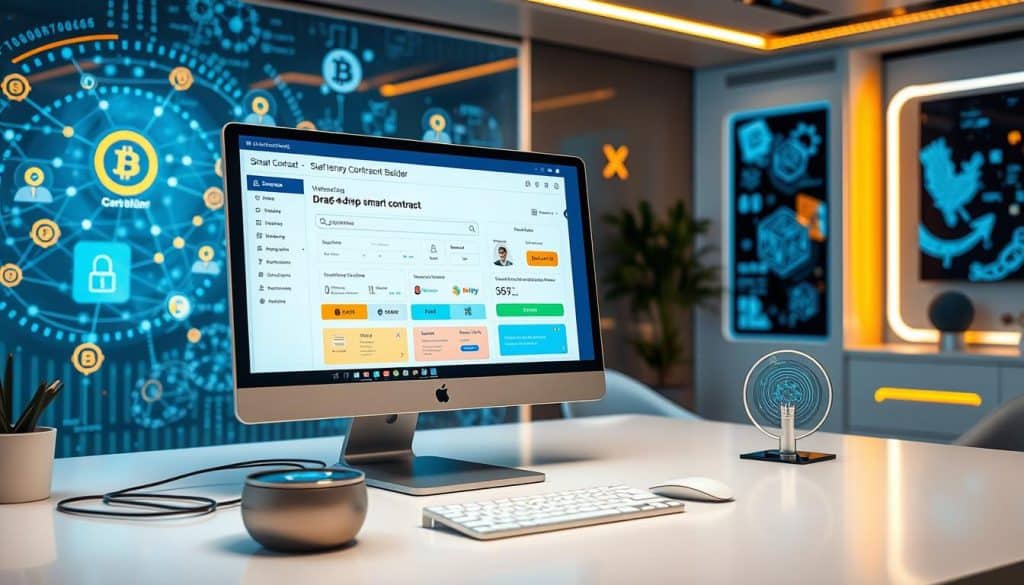Did you know that by 2025, over 80% of companies plan to use blockchain technology? This fact shows how important blockchain and smart contracts have become in our digital world1. If you think only experts can handle this cutting-edge tech, you’re in for a surprise. Now, anyone can start creating smart contracts without needing to know how to code. Thanks to platforms made for beginners, you can dive into the world of decentralized apps without any coding know-how.
The need for secure, fast, and automatic agreements is growing fast. Knowing how to build smart contracts without code can make you stand out. We’ll guide you through easy steps for making smart contracts that are perfect for beginners. You’ll learn how to make contracts that run on their own on blockchain networks, using just a few clicks and some basic terms.
Key Takeaways
- Creating smart contracts is now accessible even to those without programming skills.
- The demand for blockchain solutions is increasing rapidly among businesses.
- No-code platforms simplify the smart contract creation process.
- Learning about smart contracts can enhance your understanding of decentralized applications.
- Beginner-friendly tools allow for quick implementation of contracts.
Introduction to Smart Contracts
Smart contracts change how we handle agreements by working without middlemen. They carry out terms written in their code automatically. Because they’re built on blockchain, they’re transparent, secure, and cannot be altered. Knowing about smart contracts shows their role in today’s digital world and their diverse uses.
These tools are being used more from energy trades to owning properties. Understanding smart contracts shows us how they can make industries more efficient. They automate transactions, which cuts down the time and money spent on traditional contracts.
The idea of smart contracts has grown since Nick Szabo introduced them in the 90s. They’ve become key in creating digital agreements. Exploring smart contracts shows how they’re changing the way we do business across the globe.
Learning these basics is the first step towards using smart contracts yourself. With big financial players getting involved and ongoing advancements, their future is bright2.
What Are Smart Contracts?
Smart contracts are agreements coded into the blockchain. They automatically do something when specific conditions are met. This tech reduces the need for middlemen, slashing costs and boosting speed.
Take sending money overseas as an example. A smart contract can move cash between parties after getting a green light from a trusted source. This speeds things up and brings down the risk of scams tied to old-school methods.
Smart contracts depend on blockchain’s clear, unchangeable records. Sites like CoinUp.io have debuted stock contracts for big names like Apple, NVIDIA, and Tesla. This shows how smart contracts can change the game in finance3. They offer advanced trading while meeting the needs of investors worldwide3. Plus, their security steps fend off attacks, making them safer4.
| Feature | Benefit |
|---|---|
| Automation | Reduces the need for intermediaries, expediting transactions and lowering costs. |
| Transparency | Data is recorded on the blockchain, promoting trust among parties. |
| Security | Built-in protections against common attacks enhance transaction safety. |
| Global Reach | Smart contracts can cater to users in various regions and industries. |
Advantages of Using Smart Contracts
Smart contracts are changing industries by making them more efficient and secure. They automate agreements, cutting down human mistakes.
Transparency is a big benefit of smart contracts. Every transaction is recorded on the blockchain. This lets people check for accuracy and builds trust. This setup helps in avoiding frauds and settling disputes.
Saving money is another big reason to use smart contracts. They cut out the middleman, which lowers fees and makes things run smoother. Recent findings show that using smart contracts can greatly lower costs. This boosts profits2.
Smart contracts work fast, bringing more efficiency. Businesses can see transactions happen in real time. This immediate insight helps them make quick adjustments. Fast and accurate, this can speed up services, especially in finance and shipping.
To wrap up the perks of smart contracts, here’s a quick table:
| Advantage | Description | Example |
|---|---|---|
| Transparency | Blockchain records allow independent verification. | Supply chain tracking |
| Cost Reduction | Eliminating intermediaries lowers fees. | Real estate transactions |
| Efficiency | Real-time execution minimizes delays. | Financial services |
Using smart contracts makes your business operations better. They promise more efficiency and a secure, open setting for everyone. Knowing how smart contracts help could put you ahead of others.
How to Create Your First Smart Contract (Without Coding!)
Starting your first smart contract may feel overwhelming if you’re not a coder. Luckily, there are many tools and resources that let you build smart contracts without writing code. This guide will help you grasp the various templates and tools. They make creating contracts easier.
Understanding Templates and Tools
Templates make creating smart contracts much easier. There are many platforms that offer ready-made templates. These are designed for different purposes. You can customize them as needed. These templates provide a basic structure. They allow you to set the terms of your contract without complex coding. Here are some popular options:
- Etherlime: Offers a variety of templates tailored for Ethereum-based contracts.
- Moralis: Provides user-friendly templates that support robust features.
- OpenZeppelin: Known for its secure and community-reviewed smart contract templates.
Step-by-Step Process Using No-Code Platforms
To start, pick your templates and use a no-code platform for smart contracts. Follow these simple steps:
- Create your account on a chosen no-code platform.
- Select a smart contract template that fits your project’s needs.
- Modify the contract’s terms and conditions to suit your requirements using the platform’s tools.
- Check the contract carefully to make sure all changes are correct and meet legal requirements.
- Deploy your contract to the blockchain easily, without needing to know how to code.
This process allows anyone to make smart contracts without being skilled in programming. By using templates and no-code platforms, it opens up access to powerful tools. These tools make developing smart contracts simpler5.
Beginner-Friendly Platforms for Smart Contract Creation
In the blockchain world, several best platforms for smart contracts have come up. They make it easy for users to create decentralized applications without need for prior coding knowledge. Tools like OpenZeppelin and Solidity help simplify the process through user-friendly interfaces.
OpenZeppelin is famous for its safe, pre-tested code libraries. These help you easily create and manage smart contracts. It also provides no-code development platforms for smart contracts, complete with detailed guides and community support. Plus, it works well with top blockchains, like Ethereum, making it perfect for newbies.
Solidity is mainly a coding language but it’s designed for beginners too. It offers lots of templates and step-by-step guides. This platform helps you learn smart contract basics and coding at your own pace. With tools like Solidity, you can start with simple projects and move up to more complex ones.
| Platform | Features | Ease of Use | Support & Resources |
|---|---|---|---|
| OpenZeppelin | Secure libraries, modular contracts | High | Documentation, community forum |
| Solidity | Extensive documentation, tutorials | Moderate | Online courses, active community |
| Remix IDE | Web-based IDE for Solidity | Very High | Interactive tutorials, user forum |
Picking the right platform is key to a good development journey. By using these easy-to-learn tools, you can begin making smart contracts quickly. Look for platforms with strong resources to help you learn smoothly and make your projects succeed6.
No-Code Smart Contract Development: Key Concepts
Understanding smart contracts is crucial if you want to explore no-code development. A smart contract works when certain conditions are met, doing tasks automatically. This makes transactions simpler and doesn’t require manual help.
Deployment and transaction costs, or gas fees, are vital terms in creating smart contracts. Deployment means putting a smart contract on a blockchain, making it work for users. Gas fees, on the other hand, are the costs for performing transactions or operations on the blockchain.
You also need to know about digital signatures. They check if transactions are genuine. Digital signatures help keep smart contract interactions safe and reliable.

Different blockchains affect smart contracts in various ways. Public blockchains, like Bitcoin and Ethereum, let anyone join and are very secure. Meanwhile, private blockchains, such as Hyperledger, are only open to some users. They offer quick transactions and better privacy.
Hybrid blockchains mix both types. They have controlled access and are good for finance, healthcare, and supply chains. Learning these key terms is vital as you delve into smart contracts. They help you to better join discussions on blockchain tech. For more information, check out this resource.
| Blockchain Type | Access | Decentralization | Use Cases |
|---|---|---|---|
| Public Blockchains | Open to anyone | Highly decentralized | Cryptocurrencies, general transactions |
| Private Blockchains | Restricted access | Centralized control | Enterprise applications, data sharing |
| Hybrid Blockchains | Controlled access | Partial decentralization | Finance, healthcare, supply chain |
Grasping these smart contract concepts is basic to moving confidently in blockchain tech.
By understanding these ideas, you’re preparing for success in smart contract development. This knowledge is a key step in your tech journey78.
The Simple Smart Contract Creation Process
Creating a smart contract might seem tough at first. But the process is made to be easy for users. By picking the right blockchain, your contract will work well and safely. Ethereum and Binance Smart Chain are popular choices, each with their own pros for different needs.
Choosing the Right Blockchain
When picking a blockchain for smart contracts, it’s key to know what each platform offers. Ethereum has a large developer community and a well-established ecosystem. Binance Smart Chain stands out for its low fees and quick transactions. Thinking about these things helps you choose wisely for what you need.
Defining Contract Terms in Plain Language
It’s important to write clear contract terms. Use simple, clear language so everyone understands the agreement. This not only helps with carrying out the contract but also prevents future disputes. Clear contracts build trust and keep things transparent.
Taking time to define your smart contract terms at the start makes things run smoother. Good communication and clear terms show what both sides want and increase satisfaction.
For tips on creating clear agreements, check this creative approach to smart contract creation9.
Common Use Cases for Smart Contracts
Smart contracts are used widely in many fields, making things simpler and more transparent. In the finance sector, they help automate payments. This reduces mistakes and speeds up transactions, important in our quick-moving financial world. In the field of real estate, smart contracts make it easier to transfer properties. They automate the change of titles and settle payments, cutting down on paperwork and saving time. This helps transactions go smoothly and builds trust between parties.
In supply chain management, smart contract use cases are also very important. They allow for the real-time tracking of items from production to delivery. This ensures greater transparency and responsibility. Companies can verify the origin of their goods, making sure they follow rules and boosting customer trust. Smart contracts make these areas work better by solving old problems and improving how things operate.
| Industry | Use Case | Benefits |
|---|---|---|
| Finance | Automated Payments | Reduced errors, faster processing |
| Real Estate | Property Transfers | Simplified transactions, increased trust |
| Supply Chain | Tracking Product Provenance | Improved transparency, consumer confidence |
These are just a few examples of how smart contracts are used today. By adding them to daily operations, businesses work more efficiently and trust increases. As different sectors start to see their benefits, more and more are using smart contract technology. This sets the stage for a future where managing transactions is brighter and more trustworthy10.
Security Considerations in Smart Contract Development
Security in smart contracts is super important for a blockchain project’s success. If there are bugs, it could mean big money losses and harm the project’s reputation. It’s common to see attacks like reentrancy. This happens when an outside contract messes with the one running before it’s done. Developers need to watch out for this to keep things safe.
Gas limit problems are another thing to look out for. If a transaction goes over the gas limit, it won’t go through. This can make users upset and cause them to lose money. Knowing these issues is key to keeping smart contracts safe from expensive errors.
To make sure smart contracts are secure, it’s critical to follow best practices. Testing your contract well before putting it out there helps find and fix security issues. Also, getting a security check from known firms adds more safety. This builds trust in how the contract works.
In the end, focusing on security when making smart contracts is a must. Finding problems early and taking steps to fix them keeps your contracts running right. And it keeps the trust of the people using them5.
Testing and Deploying Your Smart Contract
Testing smart contracts is crucial before their launch. It checks that everything works right before they go live on the blockchain. Using test environments like Rinkeby or Ropsten helps find and fix any problems early. This way, you can be sure your contract works well without risking real assets.
Ready to launch? The deployment process has a few steps. First, you link your wallet to the blockchain you choose. Then, you carry out the deployment transaction. Watch the gas fees and network status to deploy smoothly and affordably.
The following table outlines key elements of testing and deploying smart contracts:
| Step | Description | Tools/Resources |
|---|---|---|
| 1. Testing | Use testnets for initial verification and debugging. | Rinkeby, Ropsten, Ganache |
| 2. Deployment Preparation | Ensure contract code is optimized and documentation is complete. | Solidity, Truffle |
| 3. Deploying Contract | Execute the deployment transaction using your wallet. | MetaMask, Remix |
| 4. Post-Deployment Checks | Verify the smart contract’s address and behavior on the mainnet. | Etherscan, Token Tracker |
Follow these steps to make your smart contract launch smoother. It also boosts security and performance once live. Spending time on careful testing and planning the deployment reduces future risks1176.
Conclusion
Smart contract creation is not just for coding experts. Now, you have the knowledge to use no-code smart contracts. This lets you make secure agreements easily. The journey into no-code smart contracts brings a simple way into a complex area.
It’s time to dive deeper into smart contract platforms and tools. Join the blockchain community and talk in forums. You might also want to learn more through courses. These steps will boost your smart contract skills and know-how.
Keep exploring and using what you’ve learned about smart contracts. The field is growing fast, offering many chances for growth. With each step, you build a strong base for success in your future projects121314.
























 Bitcoin
Bitcoin  Ethereum
Ethereum  Tether
Tether  XRP
XRP  USDC
USDC  JUSD
JUSD  TRON
TRON  Lido Staked Ether
Lido Staked Ether  Dogecoin
Dogecoin  Figure Heloc
Figure Heloc  Cardano
Cardano  Wrapped stETH
Wrapped stETH  Bitcoin Cash
Bitcoin Cash  WhiteBIT Coin
WhiteBIT Coin  Wrapped Bitcoin
Wrapped Bitcoin  USDS
USDS  Wrapped eETH
Wrapped eETH  Binance Bridged USDT (BNB Smart Chain)
Binance Bridged USDT (BNB Smart Chain)  LEO Token
LEO Token  Monero
Monero  Chainlink
Chainlink  Hyperliquid
Hyperliquid  Coinbase Wrapped BTC
Coinbase Wrapped BTC  Canton
Canton  Ethena USDe
Ethena USDe  Stellar
Stellar  WETH
WETH  Zcash
Zcash  USD1
USD1  Litecoin
Litecoin  Sui
Sui  Avalanche
Avalanche  USDT0
USDT0  Dai
Dai  sUSDS
sUSDS  Hedera
Hedera  Shiba Inu
Shiba Inu  World Liberty Financial
World Liberty Financial  PayPal USD
PayPal USD  Ethena Staked USDe
Ethena Staked USDe  Toncoin
Toncoin  Cronos
Cronos  Rain
Rain  Polkadot
Polkadot  Tether Gold
Tether Gold  Uniswap
Uniswap  Mantle
Mantle  MemeCore
MemeCore